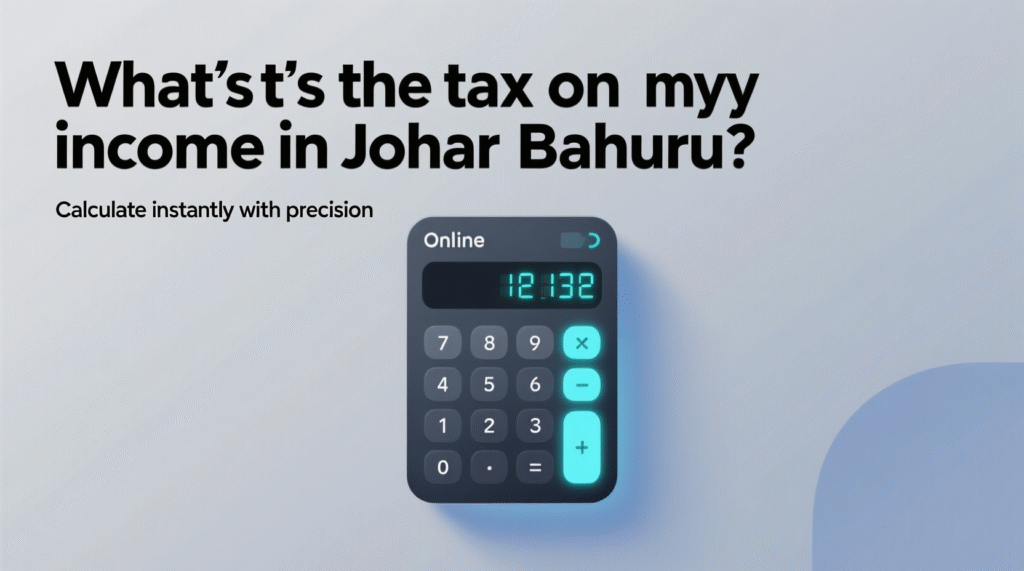
Taxes in Johor Bahru are governed by Malaysian federal tax law. For most people, the key is understanding your tax residency status. This determines your tax rate, whether it’s a progressive scale or a flat rate.
You’re a tax resident if you’re in Malaysia for 182 days or more in a calendar year. This is the most common status for employees. If you spend less than 182 days, you’re a non-resident.
The problem this guide solves is helping you understand which category you fall into and what it means for your wallet.
How to Calculate Your Income Tax as a Resident
Residents benefit from a progressive tax system, with rates from 0% to 30%. The more you earn, the higher your tax bracket. The tax is calculated on your chargeable income, which is your total annual income minus all eligible tax reliefs and exemptions.
Here’s the formula:
- Taxable Income = Annual Gross Income – Tax Reliefs – Tax Exemptions
- Tax Payable = Taxable Income x Progressive Tax Rate
Real-Life Example: Calculating a Resident’s Tax
Let’s say you’re a marketing manager in Johor Bahru earning an annual gross income of RM80,000.
- Start with your gross income: RM80,000
- Deduct key reliefs:
- Individual Relief: RM9,000
- EPF Contributions (11% of salary): RM8,800
- Lifestyle Relief (e.g., for gadgets, books): RM2,500
- Calculate your chargeable income:
- RM80,000 – RM9,000 – RM8,800 – RM2,500 = RM59,700
- Apply the progressive tax brackets to RM59,700:
- First RM50,000: Tax is RM1,500
- The remaining RM9,700 (RM59,700 – RM50,000) is taxed at 11%.
- RM9,700 x 11% = RM1,067
- Your total tax payable is: RM1,500 + RM1,067 = RM2,567
As a resident, you can see how tax reliefs significantly reduce your final tax bill.
Tax for Non-Residents and Special Zones
If you’re a non-resident, the calculation is simpler but more expensive. You’re generally taxed at a flat rate of 30% on all income derived from Malaysia, and you aren’t eligible for personal tax reliefs.
Special Economic Zone Tax Incentives
Johor Bahru has a unique advantage: the Forest City Special Financial Zone. To attract global talent, eligible “knowledge workers” in this zone may be taxed at a special flat rate of 15% on their employment income. This is a huge benefit for professionals in the area, offering a major reduction in their tax burden compared to standard rates.
How to File and Pay Your Taxes
Filing your taxes is a self-assessment process managed by the Inland Revenue Board of Malaysia (LHDN). The official portal is MyTax.
- When to File? The tax year runs from January 1st to December 31st. For individuals with employment income, the filing deadline is typically April 30th of the following year.
- How to Pay? Your employer likely deducts taxes monthly via the PCB (Monthly Tax Deduction) system, so you may only need to top up or receive a refund when you file. You can pay any outstanding balance through the MyTax portal.
Frequently Asked Questions (FAQs)
1. How much salary is taxable in Malaysia?
Your chargeable income is what’s taxed. This is your gross salary minus all the tax reliefs you’re eligible for. If your chargeable income is below RM5,000, you don’t pay tax.
2. What is the difference between tax reliefs and rebates?
Tax reliefs directly reduce your taxable income, lowering the amount subject to tax. Tax rebates, on the other hand, are a direct reduction of the tax amount you have to pay.
3. Can foreigners claim tax reliefs in Malaysia?
Yes, if they are considered tax residents (in Malaysia for 182 days or more). They can claim the same personal reliefs as Malaysian citizens. Non-residents are not eligible for these reliefs.
4. Why do I need to keep receipts for my tax reliefs?
LHDN operates on a self-assessment basis but may perform an audit. You need to keep receipts and supporting documents for at least seven years to prove your claims and avoid penalties.
5. Is my foreign income taxed in Malaysia?
Generally, foreign-sourced income received in Malaysia by a resident individual is exempt from tax. However, there are exceptions for partnership business income. It’s always a good idea to check the latest LHDN guidelines.
Willium is the creator of IncomeTaxCalculatorMalaysia.com, a trusted resource for accurate and easy-to-use tax calculation tools. With a deep understanding of Malaysia’s tax system, he helps individuals and businesses estimate their income tax with confidence. Willium is dedicated to simplifying financial decisions by offering clear, reliable tools and expert guidance, empowering users to stay informed and save time.
